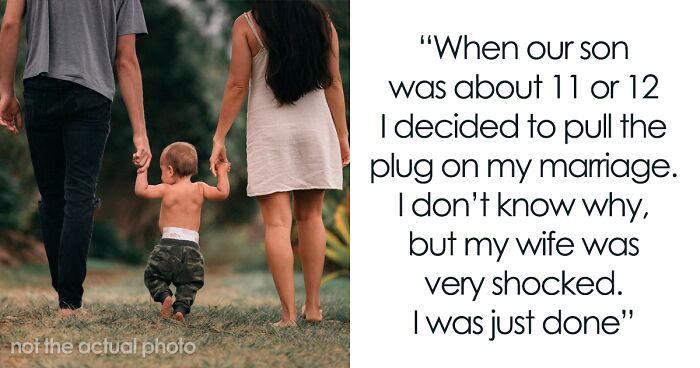
“I Went Through Hell And Back”: Man Wants Nothing To Do With Ex’s Son, His Wife Is Horrified
Interview With ExpertAlthough heartbreaking, family estrangement is quite a common occurrence. Research shows that 27% of Americans have a family member they have no contact with. And it’s not necessarily parents and children. Rifts between siblings happen, too. After years of not talking, people find it hard to reconnect: “What if the other person hates me? What if they (or I) can’t forgive?”
The author of this story found himself in a similar situation. The Redditor u/Longest-Journey had a son who wanted to reconnect. But the OP felt that there was too much hurt and pain and found himself unable to do it. So he asked other netizens to weigh in.
To know more about family rifts and how to repair them, Bored Panda reached out to Fern Schumer Chapman and Psychotherapist Amanda Ann Gregory. Chapman is the author of several books, including Brothers, Sisters, Strangers, and The Sibling Estrangement Journal. She offers private, one-on-one coaching sessions to those who struggle with sibling estrangement issues, as well. And Gregory is a licensed, EMDR-certified trauma psychotherapist.
We asked them what can cause rifts between family members and how adult children and their parents can go about fixing them.
More info:
Fern Schumer Chapman | Facebook | Instagram | LinkedIn | Twitter
Amanda Ann Gregory | Instagram | Facebook | LinkedIn
Divorce can be tricky when there are children involved
Image credits: Jakob Owens / Unsplash (not the actual photo)
This father found himself unable to reconnect with his estranged son due to past guilt and resentment
Image credits: YuriArcursPeopleimages / Envato Elements (not the actual photo)
Image credits: Andrik Langfield / Unsplash (not the actual photo)
Image credits: Erik Mclean / Pexels (not the actual photo)
Image credits: Torsten Dettlaff / Pexels (not the actual photo)
Image credits: Longest-Journey
Staying connected with family members matters
The situation OP describes here is undoubtedly difficult and painful for all family members. The then-pre-teen son’s reaction to his parents’ divorce might seem overboard, but the now-adult son seeks reconciliation. Bored Panda asked Fern Schumer Chapman to explain why estranged family members feel the need to reconnect even after years of resentment and hurt feelings.
“Humans have a deep need to belong,” the author says. “The eminent psychologist Abraham Maslow identified this crucial need in his Hierarchy of Needs, a color‐coded, weighted pyramid of basic human requirements.”
“The need to belong—whether through family, friendship, shared interests, or sexual intimacy—ranks just after the essentials: food and water, shelter and sleep, physical safety. Like these fundamentals, the human need to belong is lifelong.”
“[If you] absent a sense of belonging—this feeling of emotional safety and context—people come to fear that their very lives are at risk. They lose the ability to trust and connect with others, instead becoming consumed by the task of surviving alone.”
“The family—that original constellation of relationships—offers an opportunity to belong to a group and a chance to develop deep, lifelong connections that may transcend the transient nature of our existence,” the expert on family estrangement explains.
Image credits: cottonbro studio / Pexels (not the actual photo)
In the case of divorce, the responsibility to reconnect lies with the parent, not the child
Trauma Psychotherapist Amanda Ann Gregory says that when parents go through a divorce, there is a challenge for the now-single (or remarried) parent to build an attachment to the child.
“Sometimes, one parent takes on the role of the main attachment figure,” she explains. “When divorce occurs, the parent who is not the attachment figure must recognize this and decide if they will or can fill this role for the child in their new home.”
“This can be challenging if the parent has experienced obstacles that prevent them from establishing a secure attachment with their child.” Examples of such obstacles can be childhood trauma or a lack of experiencing secure attachment as a child (and possibly as an adult).
Gregory emphasizes that the parent should initiate reconnection; the responsibility does not lie with the child. “Newly divorced parents need to put time and effort into establishing a household that fosters relationship repair and reconnection,” she says.
Those who want to reconnect with a family member should consider these six steps
The author of The Sibling Estrangement Journal says that a person should examine their feelings in great detail before trying to resume a relationship. She says the person should ask themselves these questions:
- Why is this relationship important to me, not to my family or to anyone else but to me?
- Does my family member want to resume a relationship?
- Can I set aside the anger, pain, and/or resentment that led to the break to change our pattern of relating?
- Do I want to resume this relationship if I discover that neither of us have changed?
- Do I have the time, energy, emotional resilience, and support of other loved ones to reconcile and rebuild this relationship?
- Will I compromise too much of myself if I try to sustain a relationship with my difficult family member?
Image credits: Engin Akyurt / Pexels (not the actual photo)
What to say and what not to say when trying to reconcile with an estranged family member
When a person has weighed the ins and outs of their decision, it’s time to act. But you can’t just simply walk to their door and ring the bell, can you? Fern Schumer Chapman suggests looking at the confrontation as if it was a dispute. She suggests a strategy from Dr. Donna Hicks, an associate at the Weatherhead Center for International Affairs at Harvard University.
“[Hicks] has worked as a third-party facilitator in some of the world’s most intractable conflicts [and] has drawn upon her experiences mediating international disputes to create a model for communication that applies to families as well as to nations,” Chapman tells Bored Panda.
“Dignity, she explains, invests each of us with an inherent value and worth. When individuals are denied their dignity, they feel inconsequential and irrelevant, and they become enraged and resentful that they are not seen or heard,” Chapman goes on.
The person then might start asking questions like, “How can you treat me like this?”, “Can’t you see we are human beings?”, “Can’t you see we are suffering?”
The four steps to resolve such a conflict, according to Hicks, include:
- Sitting down together face to face.
- Listening without interrupting and challenging each other’s stories. “The one goal is to seek understanding. Experts agree that reconciliation is impossible without true, genuine listening,” Chapman emphasizes.
- Acknowledging that the other person hurts, is angry, or alienated and empathizing with them. “Give them the benefit of the doubt; assume they have sincere, trustworthy intentions. When each party accepts both parties’ experiences, neither feels devalued or shut out,” Chapman adds.
- Stressing and acting on your willingness, desire, and hope to create a mutual bond.
- And, lastly, letting go of anger.
Image credits: Priscilla Du Preez / Unsplash (not the actual photo)
Sometimes, family members choose not to reconnect
Psychotherapist Amanda Ann Gregory claims that both sides need to want to reconnect. “Reconciliation occurs when two or more people decide to enter into a new relationship after harm has occurred in that relationship,” she says.
“Reconciliation is not forgiveness (often defined as a decrease in guilt and resentment), and reconciliation does not require forgiveness in order to occur. Family members can feel guilt and resentment and also choose to reconcile. In contrast, they can forgive and choose not to reconcile.”
She says that one of the main reasons why people choose not to reconcile is that they do not feel safe. And the reasons can vary: maybe it feels too overwhelming and emotionally unsafe to address their own childhood trauma. Others might not feel an attachment to that family member.
Maybe they feel guilt or shame and need to make some changes before reconnecting. “They can also feel as if their family member is physically, emotionally, sexually, financially, or spiritually unsafe, and they do not wish to put themselves at risk,” Gregory explains.
Commenters reacted to OP’s story and pleaded with him to give his son a second chance
Many other netizens called the OP a jerk
Poll Question
Thanks! Check out the results:
For anyone else who is wondering what happened next: "I see now that I should look at his actions from a child's perspective. I already have therapy scheduled for today. I deleted the draft and somehow reluctantly agreed that my mother write him an email to establish contact. She loves my son very much and was shut off, just like me. It means everything in the world to have her grandson back in our lives. I will discuss with my therapist if that is the right way to go. Contrary to popular belief, my wife and mother don't see me as a monster. I'm not getting divorced anytime soon. The three of us had a very emotional discussion, and I know they were just trying to help me. Things were said in the heat of the moment, but all is well between us now. We will see how the future unfolds."
I want to hear the son's side of the story. I wonder what the father has left out of his retelling of events
OP's wanna-send email is confirmation of the kid's perceptions when he was 12. If OP sends it, the kid will be hurt all over again, and that will suck. But it will also bring closure because the kid will know he was right when he was young, and never have to face that questioning uncertainty of giving his father the benefit of the doubt again.
Load More Replies...I predict divorce #2 coming in soon. I'm sure he sold his second wife on the narrative that he was a good dad who desperately tried everything he could to be in his son's life and was heartbroken to loose him. When in reality he got all butthurt when his son was understandably upset by the implosion of his family, did the bare minimum, and walked away. I'm sure the new wife expected that if the son ever reached out her husband would be ecstatic. Now she knows that he is the type of man who can just walk away from his kids and never look back.
I'm shocked that the father sees himself as the victim here. Getting pushed away by your own son hurts but it's a totally normal reaction to a situation he suffered greatly from but had absolutely no control over. He didn't need to apologise (and I'd argue he shouldn't have). The fact that he did and dad still doesn't want to know speaks volumes about dad. Yta.
It’s no small thing to have your child tell you they hate you and the kid (who’s now an adult) definitely had to apologize for that. Pretty much everyone I know has divorced parents (including me) and none have ever said anything like “I hate you” to any of their parents just because of the divorce. I think you underestimate how much it hurts a parent to not be able to see their child, my stepfather almost took his own life because of it.
Load More Replies...I can't make up my mind if this man is too sensitive, who feels everything too deeply, or a heartless malignant narcissist.
8Yorkies, I'm going to go with a man who was deeply, deeply hurt, and this led to depression. He is now in a good place, and doesn't want to risk opening up the old pain (probably because he hasn't dealt with it). I can understand all of this, but I also understand his son's reaction, and why the hurt came about. The guy is so worried about opening himself up to pain that he can't see there is the potential to be welcoming in joy too. His son wants him, and there's also a grandchild too. ......................Family counselling would be good for them. There is so much good that can come from this.
Load More Replies...A great example of a super terrible father here who the heck blames a twelve year old for being upset when you literally walk out of his life within a week?!? It doesn’t matter what was between him and his wife his son is a different relationship a different story. This guy is a piece of sh.. and I feel so so sorry for his son - especially that he now has to beg for his father’s attention. I am actually angry typing this. The OP is so self center ed and terrible I can’t actually believe it.
Nobody blames the kid for being upset though. OP stated that he made countless attempts to have contact with his kid and the kid refused everything. At 12 you’re still a kid but even kids can’t fail to realize that shutting someone out of your life and only ever saying “I hate you” is eventually going to lead to them giving up. Even kids know you can’t expect someone to fight for you forever.
Load More Replies...OP doesn’t even address the fact that his son may have felt abandoned by him. It doesn’t seem OP has any sort of ability to walk in someone else’s shoes and quite honestly seems selfish. OP may have been hurt by his child’s actions, but those were the direct result of his own decisions, which he doesn’t seem to acknowledge. YTA
OP, are you really sure that you want to demolish this bridge, once and for all? Your son was a 12-year-old at the time of your divorce; his reaction was from the standpoint of a 12-year-old. I understand that you were in a dark place in your life, and your son's rejection of you only twisted the knife. But in his shoes, how would YOU react to your parents' divorce? Now that he has his own family, he's had time to think about the hurt he caused you and wants to make amends. Your wife is justified in being horrified at that email you wrote. If you can so easily reject your firstborn, how long before you do the same with your current family?
Sending that email could be the death knell for your marriage. Seek therapy; it will help you have a better perspective on how to reach out to your son. It may take several sessions, a few with your son present, but it's better for all concerned than telling your son to screw off (yes, that's what you're doing). You two may not become each other's BFF, but at least you'll gain respect from each other. Besides, wouldn't you like to meet your grandchild someday? Rethink that email, please; you will be causing more pain than you realize.
Load More Replies...The OP is traumatised, which is understandable. However, the fact that he made a rough draft instead of sending it directly is because he knew deep down that it was wrong. He may want to tell his son that he would like to see him again, but that he needs a couple of months to deal with this in therapy before they meet again. People want to excuse mean actions of children, but they still HURT the parents. After my divorce (caused by his cheating/violence), my daughter first said she wanted to spend more time with her Dad because he fed her ice cream for breakfast, denied he did anything, and bought her toys every weekend. I understood she was only 6, but it still really hurt.
He's not traumatized, he's an a-hole twisting things to get sympathy.
Load More Replies...For anyone else who is wondering what happened next: "I see now that I should look at his actions from a child's perspective. I already have therapy scheduled for today. I deleted the draft and somehow reluctantly agreed that my mother write him an email to establish contact. She loves my son very much and was shut off, just like me. It means everything in the world to have her grandson back in our lives. I will discuss with my therapist if that is the right way to go. Contrary to popular belief, my wife and mother don't see me as a monster. I'm not getting divorced anytime soon. The three of us had a very emotional discussion, and I know they were just trying to help me. Things were said in the heat of the moment, but all is well between us now. We will see how the future unfolds."
I want to hear the son's side of the story. I wonder what the father has left out of his retelling of events
OP's wanna-send email is confirmation of the kid's perceptions when he was 12. If OP sends it, the kid will be hurt all over again, and that will suck. But it will also bring closure because the kid will know he was right when he was young, and never have to face that questioning uncertainty of giving his father the benefit of the doubt again.
Load More Replies...I predict divorce #2 coming in soon. I'm sure he sold his second wife on the narrative that he was a good dad who desperately tried everything he could to be in his son's life and was heartbroken to loose him. When in reality he got all butthurt when his son was understandably upset by the implosion of his family, did the bare minimum, and walked away. I'm sure the new wife expected that if the son ever reached out her husband would be ecstatic. Now she knows that he is the type of man who can just walk away from his kids and never look back.
I'm shocked that the father sees himself as the victim here. Getting pushed away by your own son hurts but it's a totally normal reaction to a situation he suffered greatly from but had absolutely no control over. He didn't need to apologise (and I'd argue he shouldn't have). The fact that he did and dad still doesn't want to know speaks volumes about dad. Yta.
It’s no small thing to have your child tell you they hate you and the kid (who’s now an adult) definitely had to apologize for that. Pretty much everyone I know has divorced parents (including me) and none have ever said anything like “I hate you” to any of their parents just because of the divorce. I think you underestimate how much it hurts a parent to not be able to see their child, my stepfather almost took his own life because of it.
Load More Replies...I can't make up my mind if this man is too sensitive, who feels everything too deeply, or a heartless malignant narcissist.
8Yorkies, I'm going to go with a man who was deeply, deeply hurt, and this led to depression. He is now in a good place, and doesn't want to risk opening up the old pain (probably because he hasn't dealt with it). I can understand all of this, but I also understand his son's reaction, and why the hurt came about. The guy is so worried about opening himself up to pain that he can't see there is the potential to be welcoming in joy too. His son wants him, and there's also a grandchild too. ......................Family counselling would be good for them. There is so much good that can come from this.
Load More Replies...A great example of a super terrible father here who the heck blames a twelve year old for being upset when you literally walk out of his life within a week?!? It doesn’t matter what was between him and his wife his son is a different relationship a different story. This guy is a piece of sh.. and I feel so so sorry for his son - especially that he now has to beg for his father’s attention. I am actually angry typing this. The OP is so self center ed and terrible I can’t actually believe it.
Nobody blames the kid for being upset though. OP stated that he made countless attempts to have contact with his kid and the kid refused everything. At 12 you’re still a kid but even kids can’t fail to realize that shutting someone out of your life and only ever saying “I hate you” is eventually going to lead to them giving up. Even kids know you can’t expect someone to fight for you forever.
Load More Replies...OP doesn’t even address the fact that his son may have felt abandoned by him. It doesn’t seem OP has any sort of ability to walk in someone else’s shoes and quite honestly seems selfish. OP may have been hurt by his child’s actions, but those were the direct result of his own decisions, which he doesn’t seem to acknowledge. YTA
OP, are you really sure that you want to demolish this bridge, once and for all? Your son was a 12-year-old at the time of your divorce; his reaction was from the standpoint of a 12-year-old. I understand that you were in a dark place in your life, and your son's rejection of you only twisted the knife. But in his shoes, how would YOU react to your parents' divorce? Now that he has his own family, he's had time to think about the hurt he caused you and wants to make amends. Your wife is justified in being horrified at that email you wrote. If you can so easily reject your firstborn, how long before you do the same with your current family?
Sending that email could be the death knell for your marriage. Seek therapy; it will help you have a better perspective on how to reach out to your son. It may take several sessions, a few with your son present, but it's better for all concerned than telling your son to screw off (yes, that's what you're doing). You two may not become each other's BFF, but at least you'll gain respect from each other. Besides, wouldn't you like to meet your grandchild someday? Rethink that email, please; you will be causing more pain than you realize.
Load More Replies...The OP is traumatised, which is understandable. However, the fact that he made a rough draft instead of sending it directly is because he knew deep down that it was wrong. He may want to tell his son that he would like to see him again, but that he needs a couple of months to deal with this in therapy before they meet again. People want to excuse mean actions of children, but they still HURT the parents. After my divorce (caused by his cheating/violence), my daughter first said she wanted to spend more time with her Dad because he fed her ice cream for breakfast, denied he did anything, and bought her toys every weekend. I understood she was only 6, but it still really hurt.
He's not traumatized, he's an a-hole twisting things to get sympathy.
Load More Replies...
 Dark Mode
Dark Mode 

 No fees, cancel anytime
No fees, cancel anytime 







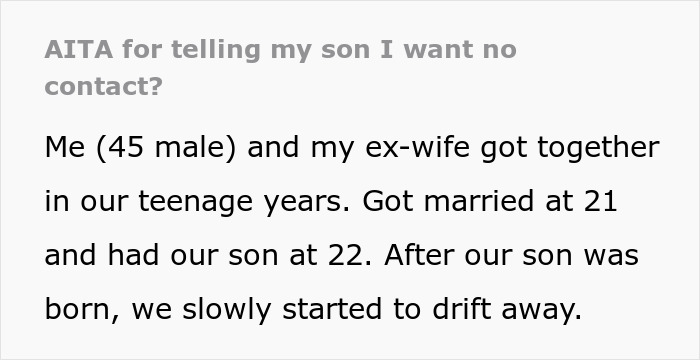


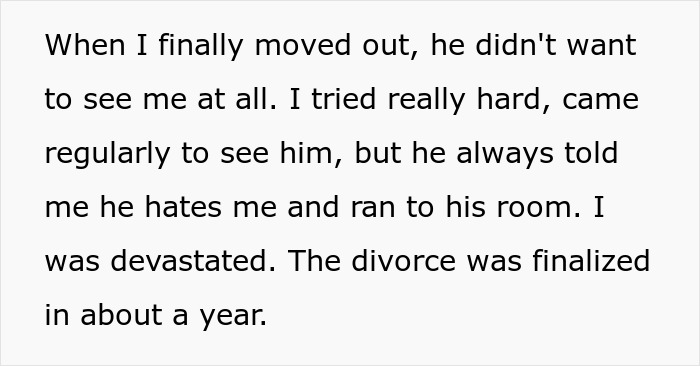

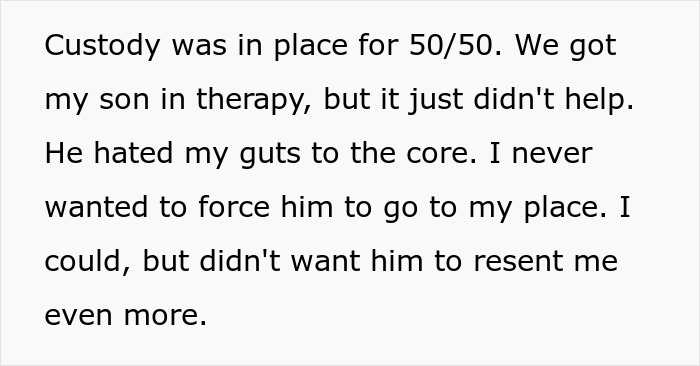


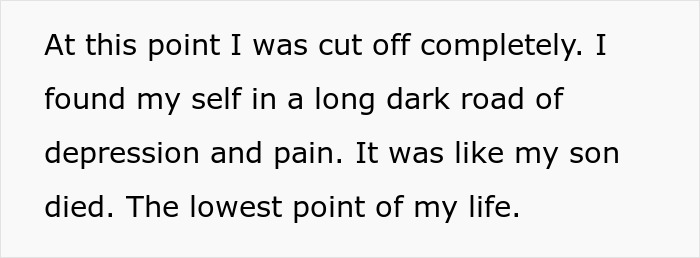




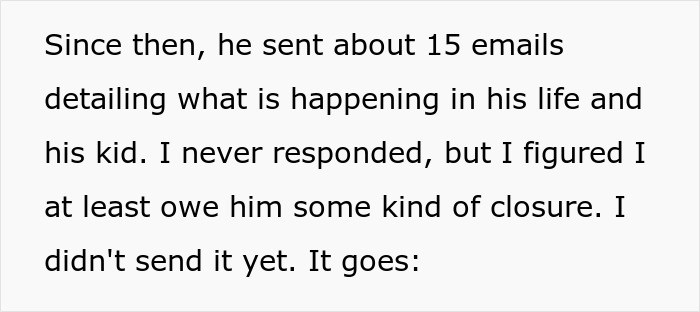
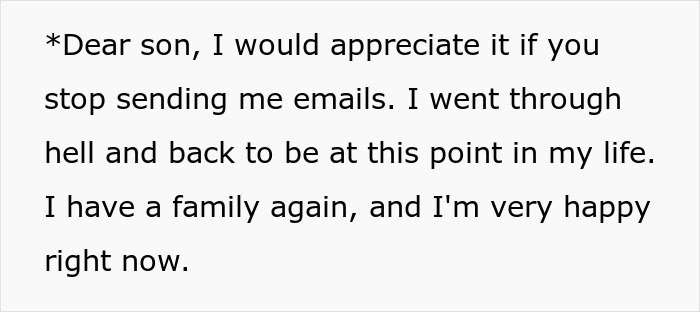




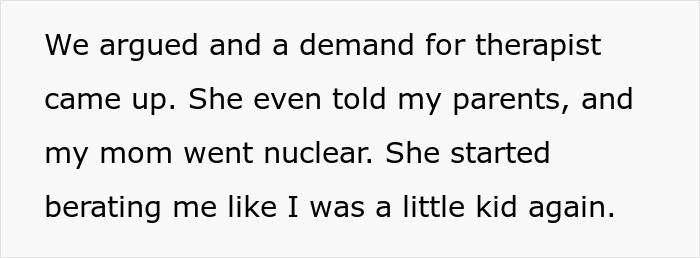
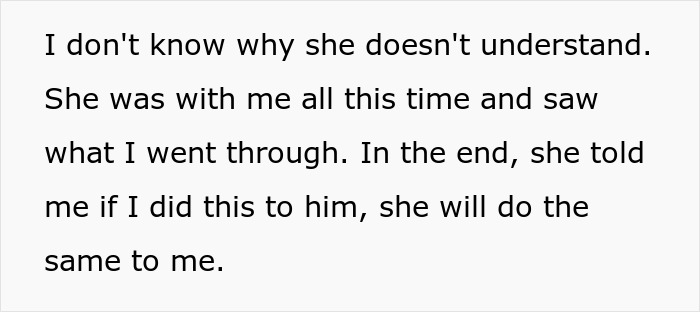





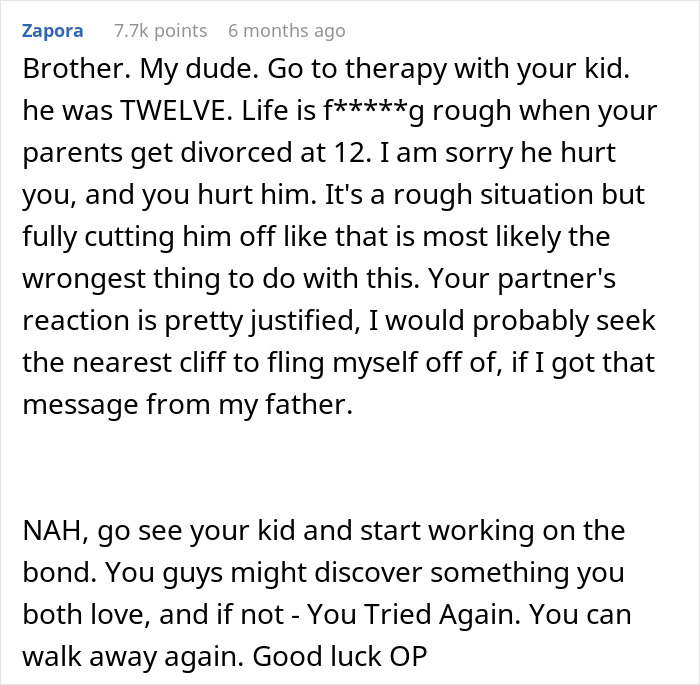
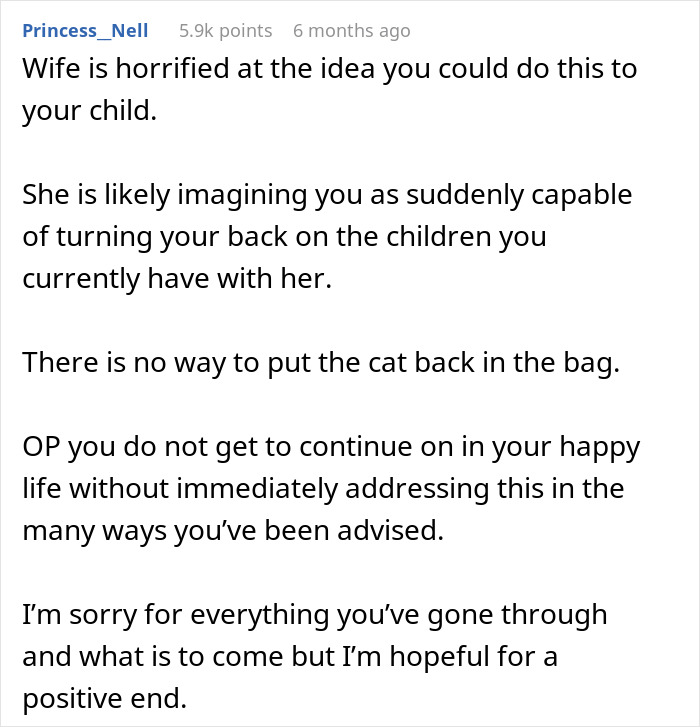
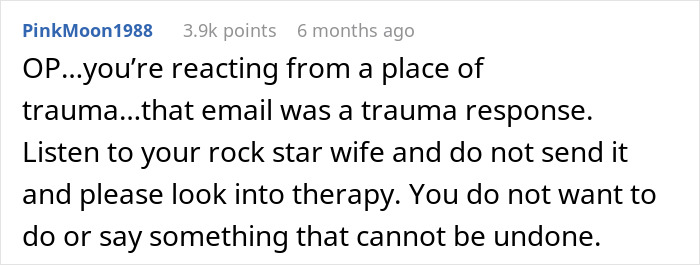
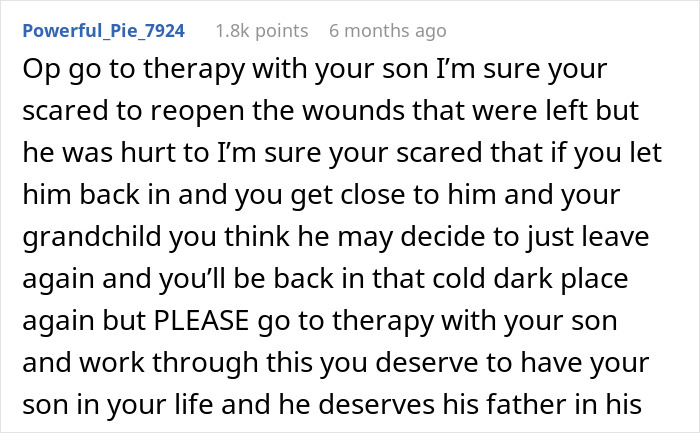
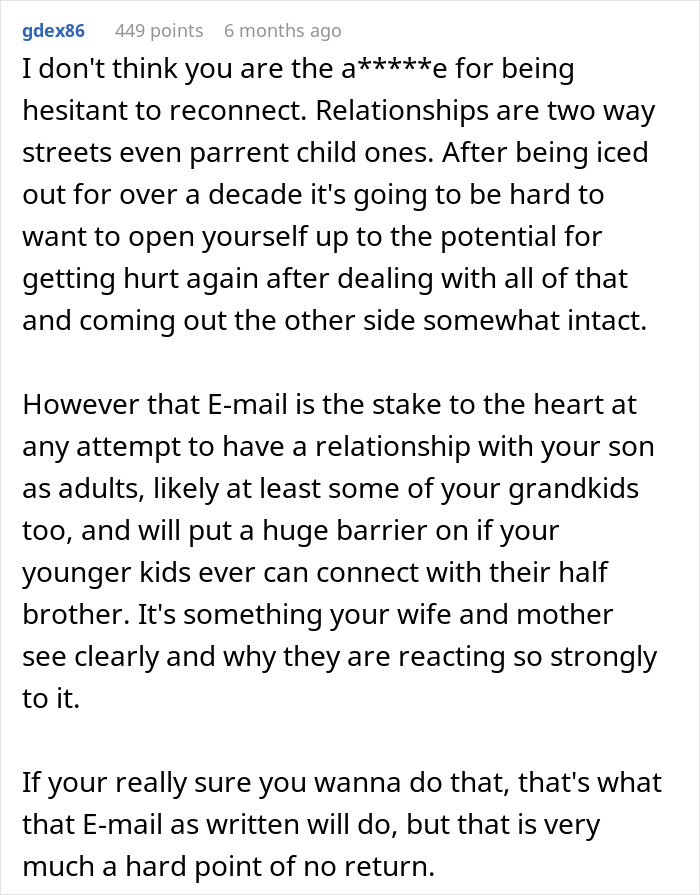
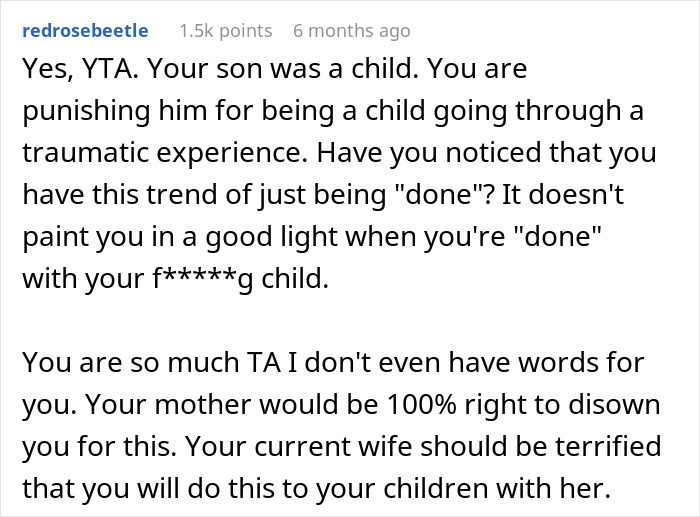

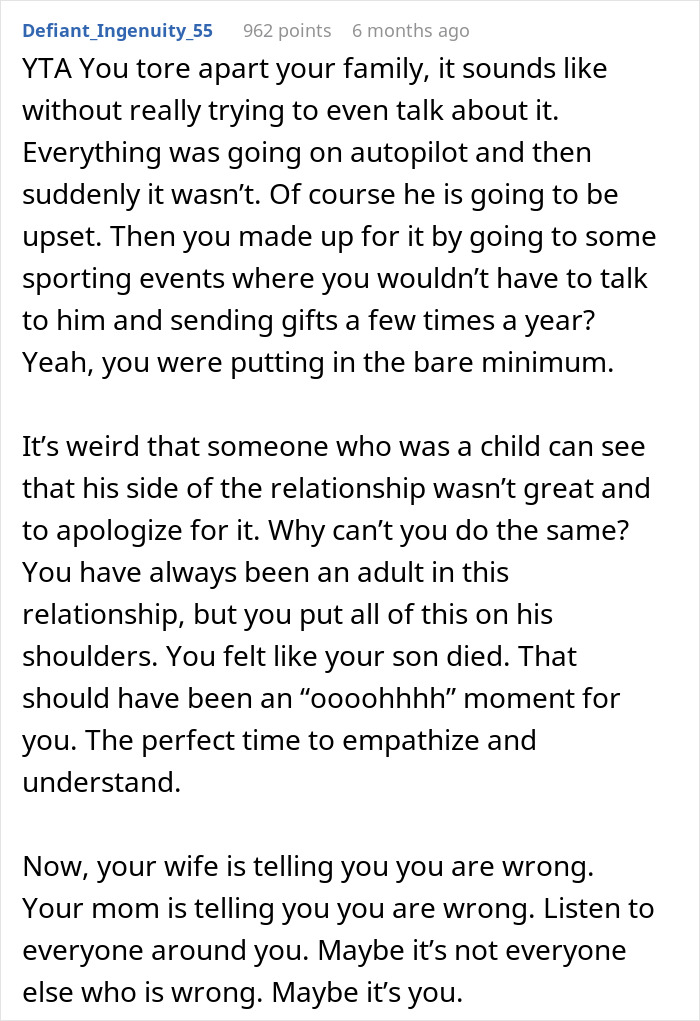
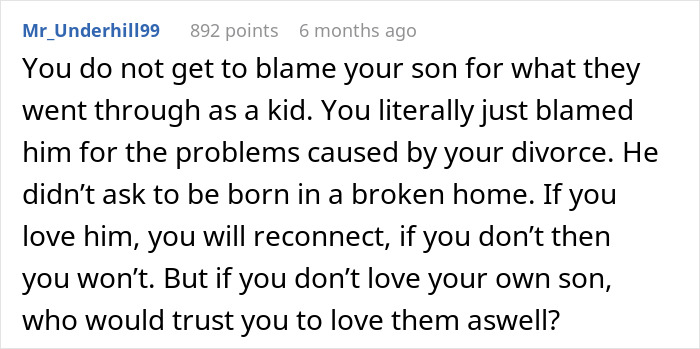
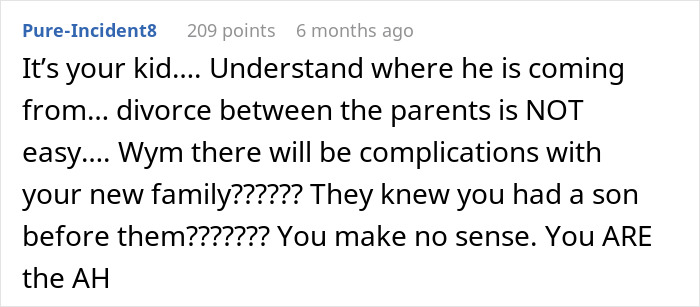

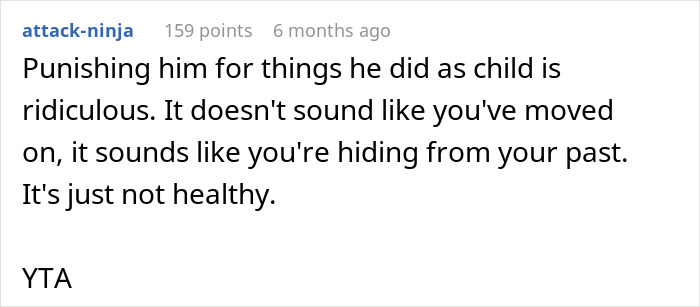











































62
92